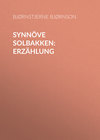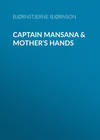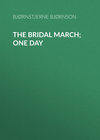Buch lesen: «Magnhild; Dust», Seite 10
DUST
CHAPTER I
The drive from the town to Skogstad, the large gard belonging to the Atlung family, with its manufacturing establishment on the margin of the woodland stream, at the usual steady pace, might possibly occupy two hours; but in the fine sleighing we had been having it could scarcely take an hour and a half. The road was a chaussée running along the fjord. All the way from town I had the fjord on the right-hand side, and on the left broad fields, gently sloping down from the heights and dotted with villas and gards, surrounded by hedges of trees and having avenues leading to them.
Farther on, the heights became mountains, and rose more abruptly from the shore; here, too, they became more and more rugged, and at last had no other growth than the pine forest, from the uppermost ridge all the way down to the fjord, forest, forest, far as the eye could reach. This belonged to Skogstad; the factory on the Skogstad River prepared the raw material.
The Atlungs were of French descent, having settled here in the times of the Huguenots, and were people of plain origin who had bettered their condition by marrying into the once wealthy and influential Atlung family, taking its name, which sounded not unlike their own.
I thoroughly enjoyed the drive. It had recently been snowing, and the snow still lay on the trees; not a breath of wind had left its traces in the wood. On the other hand, it had been thawing a little, which the deciduous trees that here began to press forward farther down toward the road could not tolerate; the sole covering they wore was the new-fallen snow of the morning.
Between both the white landscape and the snow-laden air, the fjord appeared black. It was not far to the opposite side, and there still loftier mountains loomed up, now also white, but of that subdued tint imparted by the atmosphere.
Where I was driving the sea lay close up to the edge of the snow, only a few sea-weeds, some pebbles, and in some places not so much as these, separated the two forms and hues of the same element – reality and poetry, where the poetry is just as real as the reality, simply not so enduring.
As soon as I had advanced as far as the forest, this attracted my undivided attention. The fir-trees held great armfuls of snow; in some places it had been showered around; nevertheless there was still so much uncovered that a shimmer of dark green overspread the whiteness of the entire forest. On a nearer view it could be seen that the single uncovered branches were thrust forth, as it were, defiantly, and that the red-tinted lower boughs had pierced the snow-drifts.
Higher up mighty trunks were visible, most of them dark, although some of the younger ones were brighter: taken all together an assemblage of well-laden giants, and this gave an air of solemnity to the thicket. The foremost trees, which were low enough not to impede the view, and which while growing had been disfigured either by man or beast, perhaps too by the storms (for they had borne the brunt of these), had not the regular shapes of the others; they were more gnarled, affording the snow an opportunity to commit what ravages it chose among them. Their lowest branches were in some places quite bowed to the ground, often making the tree appear like an unbroken mass of white; others were fantastically transformed into clumsy dwarfs, with only upper parts to their bodies, or into sundry human forms, each with a white sack drawn over the head, or a shirt that was not put on right.
Alongside of these awkward figures I noticed small clusters of deciduous trees, over which but the faintest suspicion of snow was spread; a single one, which stood apart from the rest, looked as though its outmost white branches, as they grew finer and finer, gradually flowed into the air; then there were young spruce trees which formed pyramid upon pyramid of regular layers of snow. Close down by the sea, where there were more stones, might now and then be seen a bramble bush. The snow had spread itself on every thorn, so that the bush looked as if it were strewed over with white berries.
I rounded a naze with a crag upon it, and here is where Skogstad proper begins. The ridge recedes and is broken by the river. Again we see gently sloping fields, and here lies the gard. The river flows farther away; the red roof and a row of buildings alongside become visible. On either side of the gard lie the housemen's places with their surrounding grounds, but they are separated from the gard by fields on the one side and by a wood or park on the other.
At the sight of the park I forgot all that had gone before. Originally it was intended to slope down to the sea; but the stony ground had evidently rendered this impossible, and so the trees on the lower square had been felled; but in the course of years, instead of pine woods a vigorous growth of deciduous trees had shot up. These, being of the same year's growth, were of an equal height, and extended all the way up to the venerable pine trees in the park. The effect of the delicate encircling the ponderous, the light opposed to the heavy, the low and perpetually level at the foot of the upward-soaring and powerful, was very fine.
The eye reveled in this, searching for forms; I would combine a hundred branches in one survey, because they ran parallel in the same curve, at about the same height; or I would single out one solitary bough from the rest and follow it from its first ramification through the branches of its branches to the most delicate twig, – a distended, transparent white wing, or a monstrous fern leaf strewed all over with white down. Then I was compelled once more to cease following the forms and turn to the colors; the unequal coating presented an infinite variety.
I turned my back on my traveling companion, the fjord, and wound my way up to the gard. Where the park ended, the garden began, and the road followed this in a gradual ascent. Once there had been a wood here also, and the road had passed through it; but of the wood there was left but a few yards, on either side, thus forming the avenue. Large, old trees were about being replaced by young ones, whose growth was so dense that in some places I could not see the gard I was driving toward. But the snow-romance followed, decking the sinking giants with white flags, powdering the young and fresh ones, and playing Christmas masquerade with the deformed ones.
CHAPTER II
The impressions of nature play their part in our anticipations of what we are about to meet. What was there so white and refined in the experience that awaited me here?
She was not clad in white, to be sure, the last time I saw her, the bright attractive being whom I was now to meet again. On her wedding journey, and in Dresden, some nine years previous to this time, we had last been together. True, she was dressed in gala attire every day – a whim of the young bridegroom, in his blissful intoxication; but most frequently she wore blue, not once did she appear in white; nor would it have been becoming to her.
I remember them especially as they sang at the piano, he sitting, because he was playing the accompaniment, she standing and usually with her hand on his shoulder; but what they sang was indeed white, at least it was always of the character of a more or less jubilant anthem. She was the daughter of a sectarian priest, and they had just come from the parsonage and from the wedding feast. Since then I had heard of them from time to time at the parsonage, and from that source I had received repeatedly renewed urgent entreaties to visit them the next time I was in their vicinity. I was now on my way to them.
I had heard the dwelling-house spoken of as one of the largest frame buildings in Norway. It was gray and immensely long. No Atlung had ever been satisfied with what his predecessor had built, and so the house had had an addition made to it by every generation and a partial remodeling of the old portions, so far as it was necessary to make these correspond with the new. I had heard that many and long passages (concerning which at festal gatherings rhymes without end were said to have been made) endeavor to unite the interior in the same successful or unsuccessful manner as the out-buildings, sloping roof, balconies, and verandas attempt to keep up the style of the exterior. I have heard how many rooms there are in the house, but I have forgotten it.
The last addition was made by the present owner, and is in a sort of modernized gothic style.
Behind the dwelling the other buildings of the gard form a crescent, which, however, protrudes in rather an unsightly manner on one side. Between these and the dwelling I now drove in order to alight, according to the post-boy's advice, at a porch in the gothic wing. I did not see a living being about the gard, not even a dog. I waited a little but in vain, then walked through the porch into a passage, where I took off my wraps, and then passed on into a large bright front room to the right. Neither did I see any one here; but I heard either two children's voices and a woman's voice, or two female voices and one child's voice, and I recognized the song, for it was one that was just then floating about the country, the lament of a little girl that she was everywhere in the way except in heaven with God, who was so glad to have unhappy children with Him. It sounded rather strange to hear such a lament in this bright, lively room, filled with guns and other sporting implements, reindeer horns, fox skins, lynx skins, and similar substantial objects, arranged with the most exquisite taste.
I knocked at the door and entered one of the most charming sitting-rooms I have seen in this country, so bright its outlook on the fjord, so large it was, so elegant. The brightly polished wooden panels of the wall were relieved by carved wooden brackets, each bearing a bust or a small statue; the stylish furniture was in every direction gracefully distributed about on the Brussels carpet. Moody and Sankey's dreamy melody flowed out over this like a white or yellow sheet. This hymn belongs to a collection of Christian songs which are among the most beautiful that I know; but it made the same impression here as if beneath this modern room there was a crypt from the Middle Ages where immured nuns were taking part in ceremonies for the dead, amidst smoking lamps, and whence incense and low chanting, inseparably blended, stole up into the bright conceptions and cheerful art of the nineteenth century.
The singing proceeded from one woman and two boys, the elder of the latter seven years old or a little more, and the younger about six. The woman turned her face toward the door, and paused quite astonished at my entrance; the boys were gazing out of the window, and did not look at her; they were wholly absorbed in their singing, and therefore they continued a while after she had ceased.
Of these two boys the one resembled the father's family, the other the mother's; only the mother's eyes had been bestowed on them both. The elder of the boys had a long face, with high brow and sandy hair, and he was freckled like his father. The younger one had his mother's figure, and stooped slightly because the head was set forward on the shoulders. But in consequence of this his head was usually thrown somewhat backward in order to recover its equilibrium. The result of this again was that the lips were habitually parted, and then the large, questioning eyes and the bright curly hair encircling the fine arched brow were exactly like the mother's. The elder one was tall and thin, and had his father's lounging gait and small, outward turned feet. I observed all this at a glance, while the boys walked across the room to the table by the sofa, as their companion left them. She had advanced, after a moment's hesitation, to meet me; she was evidently not sure whether she knew me or not. On hearing my name, she discovered with a smile that it was only my portrait she had seen, the portrait in the album, a souvenir of the wedding journey of the heads of the house. She informed me that Atlung was at the factories, and would be home to dinner, that is to say in about an hour, and that the mistress of the house was at one of the housemen's places I had seen from the road; it seemed that there was an old man lying at the point of death there.
She made this announcement in a melodious, although rather feeble voice, and with a pair of searching eyes fastened on me. She had heard something about me. I had never thought that I should see one of Carlo Dolci's madonnas step down from a frame to stand in a modern sitting-room and talk with me, and therefore my eyes were certainly not less searching than hers. The way the head was poised on the shoulders, its inclination to one side, the profile of the face, and beyond all else the eyes and the eyebrows, indeed, the bluish green head kerchief, which was drawn far forward, imparting to the pale face something of its own hue – altogether a genuine Carlo Dolci!
She walked noiselessly away, and left me alone with the boys, whom I at once attacked. The elder one was named Anton, and he could walk on his hands, at least, almost; and the younger one informed me that his name was Storm, and told me a great deal more about his brother, whom he regarded with unqualified admiration. The elder, on the other hand, assured me that his brother Storm was a very bad boy sometimes; he had recently been caught at some of his naughty tricks, and so papa had given him a flogging that same day; Stina had told papa about it. Stina was the name of her who had just left us.
After this not very diplomatic introduction to an acquaintance, they stood one on each side of me and prattled away about what at present was working in their minds, with most extraordinary force. They both now told me, the elder one taking the lead and the younger following with supplementary details, that yonder at one of the houseman's places, past which I had driven, lived Hans, little Hans; that is he had lived there, for the real, true little Hans was with God. He had come to the gard to play with the boys almost every day; though sometimes they too had been over at the housemen's places, which I soon perceived were to the boys the promised land of this earth. Then one evening, about a fortnight since, Hans had started to go home at dusk; it was before the snow came, and in the park, through which he had to pass, the fish pond lay spread before him so smooth and black. Hans thought he would like to slide on it and he climbed up from the path on to the pond, for the path ran right along it. But that same day there had been a hole cut in the ice for the people to fish, and they had forgotten to put a signal there, and so little Hans slid right into the hole. A child's cry of distress had reached the gard; the milkmaid had heard it, but only once, and she had not thought very much about it, for all the boys were in the habit of playing in the park. So little Hans had disappeared and no one could say where he was. Then the ice was cut away from the pond and they found him; but the boys were not allowed to see him. They had, however, been permitted to be present at the funeral with all the little boys and girls of the factory school. But Hans was not buried in the chapel where grandfather and grandmother lie; he was buried in the churchyard. Oh, what beautiful singing they had had! The school-master had sung bass with them, and the old brown horse had drawn Hans, who was in a white painted coffin that papa had bought in town, and there were garlands of flowers on it. Mamma and Stina had arranged them. All the children got cakes before they started and currant wine. And the song was the one the boys had just been singing; Stina had taught it to them. Hans had been very poor; but now he had all he wanted; he was with God; it was only the coffin that was put in the ground. What was in the coffin? Why, it was not the real Hans that was there, for Hans was quite new now. Angels had come down to the pond with everything that the new Hans was to wear, so that he did not feel cold in the pond; he was not there. All children who died went to God, and that together with a hundred thousand million very small angels. The angels were all round about us here too; but we could not see them because they were invisible, and Hans was now with them. The angels could see us, and they were so kind to us, especially to children, and they always wanted to have very unhappy little children with them; that was the reason why they took them. It is ever and ever and ever so much nicer to be with the angels than to be here. Yes, indeed, it is, for Stina said so. Stina too would rather be with the angels than here; it was only for mamma's sake that Stina did not go to them, for mamma would be so lonely without her. All angels had wings, and now Hans's father was lying ill, and he would soon be with Hans. He also would have wings and be a little angel and fly about here and wherever he himself chose – right up to the stars. For the stars were not only stars, they were as large, as large, when we got up to them, as large as the whole earth, and that was enormously large, larger than the largest mountain. And there were people on the stars, and there were many things that were not here. And that same afternoon Hans's father was to go right to God, for God was up in heaven. They would like so much to see Hans's father get his wings; but mamma would not let them go with her. And Hans's father had already become so beautiful, as he lay in his bed, that he almost looked like an angel. Mamma had said so; but they were not allowed to see him.
Stina made her appearance as they came to the last words; she bade them come with her and they obeyed.
A door stood open to the left; I could see book-shelves in the room to which it led, so that I presumed the library must be there. I felt a desire to know what the father of these boys was reading just then – provided that he read at all. The first thing I found open on the desk, by the side of letters, account-books, and factory samples, was Bain. And Bain's English friends were the first books my eyes beheld on the nearest shelves. I took out one, and saw that it had been much read. This accorded with what I had heard of Atlung.
Just then bells were heard outside. I thought it must be the mistress of the house returning, and put back the books in the same order I had found them. In so doing I disarranged some behind them (for the books stood in two rows), and I felt a desire to examine also these that were hidden from view, which took time. I did not leave the library until just as the lady was entering the front door.
CHAPTER III
Fru4 Atlung was evidently glad to see me. She had a singular walk; it seemed as though she never fully bent her knees; but with this peculiar gait she advanced hastily toward me, grasped my hands with both of hers, and looked long into my eyes, until her own filled with tears. It was, of course, the wedding journey this look concerned, the most beautiful days of her life; – but the tears?
Nay, unhappy she could not be. She was so thoroughly the same as she was formerly, that had she not been somewhat plumper, I could not – at all events, not at once – have detected the slightest change. The expression of her countenance was exactly the same innocent, questioning one, not the slightest suggestion of a sterner line or a change of coloring; even the hair fell in the same ringlets about the backward thrown head, and the half parted lips had the same gentle expression, were just as untouched by will, the eyes wore the same look of mild happiness, even the slightly-veiled tone of the voice had the same childlike ring as of yore.
"You look as though you had not had a single new experience since last we met," was the first remark I could not help making to her.
She looked up smiling into my face, and not a shadow contradicted my words. We took our seats, each in a chair that stood out on the carpet, near the library door; our backs were turned to the windows, and thus we faced a wall where between the busts and statues that rested on the carved wooden brackets, there hung an occasional painting on the polished panels.
I gave an account of my trip, received thanks for coming at last. I delivered greetings from her parents, of whom we talked a little. She said she had been thinking of her father to-day, she would have been so glad to have had him with her; for she had just come from a dying man, whose death-bed was the most beautiful she had ever witnessed. Meanwhile, she had assumed her favorite position, that is to say, she sat slightly bowed forward, with her head thrown back, and her eyes fixed on the upper part of the wall, or on the ceiling. As she sat thus, she pressed one finger against her open under lip, not once, but with a constant repetition of the same movement. Now and then the upper portion of her body swayed to and fro Her eyes seemed to be fixed; they did not seek my face, either when she asked a question or when she received an answer, unless something special had attracted her from her position. Even then she would promptly resume it.
"Do you believe in immortality?" she asked, as though this were the most natural question in the world, and without looking at me.
But as I was surprised, and consequently compelled to look at her, I perceived that a tear was trickling down her cheek, and that those open eyes of hers were full of tears.
I felt at once that this question was a pretext; it was her husband's belief she was thinking of. Therefore I thought I would spare her further pretexts.
"What is your husband's opinion of immortality?"
"He does not believe in the immortality of the individual," replied she; "we perpetuate ourselves in our intercourse with those about us, in our deeds, and above all in our children: but this immortality, he thinks, is sufficient."
Her eyes were fixed as before, and they were still full of tears; but her voice was mild and calm; not a trace of discontent or reproach in the simple statement, which doubtless was correct.
No, she is not one of the so-called childlike women, I thought; and if she has the same innocent, questioning expression she had nine years ago, it is not because she has been without thought or research.
"You talk, then, with Atlung about these subjects, I suppose?"
"Not now."
"In Dresden you seemed to be thoroughly united about these things; you sang together" —
"He was under father's influence then. Besides, I think he was not quite clear in his own mind at that time. The change came gradually."
"I saw some books, that are now placed behind the others."
"Yes, Albert has changed."
She sat motionless, as she gave this answer, except that her finger continued its play on the under lip.
"But who, then, attends to the education of the children?" asked I.
Now she turned half toward me. I thought for a while that she did not intend to answer but after a long time she did speak.
"No one," said she.
"No one?"
"Albert prefers to have it so for the present."
"But, my dear lady, if no one teaches them, at least one thing or another is told to them?"
"Yes, there is no objection to that; and it is usually Stina who talks with them."
"And so it is left entirely to chance?"
She had turned from me, and sat in her former attitude.
"Entirely to chance," she replied, in a tone that was almost one of indifference.
I briefly related to her what Stina had told the boys about the life beyond the grave, about angels, etc., and I inquired if she approved of this.
She turned her face toward me. "Yes; why not?" said she. Her great eyes viewed me so innocently; but as I did not answer immediately the blood slowly coursed up into her face.
"If anything of the kind is to be told to them," said she, "it must be something that will take hold of their childish imaginations."
"It confuses the reality for them, my dear lady, and that is the same thing as to disturb the development of their faculties."
"Make them stupid, do you mean?"
"Well, if not exactly stupid, it would at least hinder them from using their faculties rightly."
"I do not understand you."
"When you teach children that life here below is nothing to the life above, that to be visible is nothing in comparison to being invisible, that to be a human being is far inferior to being an angel, that to live is not by any means equal to being dead, is that the way to teach them to view life properly, or to love life, to gain courage for life, vigor for work, and patriotism?"
"Ah, in that way! Why, that is our duty to them later."
"Later, my dear lady? After all this dust has settled upon their souls?"
She turned away from me, assumed her old position, stared fixedly at the ceiling, and became absorbed in thought.
"Why do you use the word dust?" she began presently.
"By the word dust I mean chiefly that which has been, but which now having become disintegrated, floats about and settles in vacant places."
She remained silent a little while.
"I have read of dust which carries the poison from putrified matter. You do not mean that, I suppose?"
There was neither irony nor anger in the tone, so I failed to understand at what she was aiming.
"That depends on where the dust falls, my dear lady; in healthy human beings it only creates a cloud of mist, prejudices which prevent them from seeing clearly; if there be stagnation this dust will oftentimes collect an inch thick, until the machinery is thoroughly clogged."
She turned toward me with more vivacity than she had yet shown, and leaning on the arm of her chair brought her face nearer to mine.
"How did you happen upon this idea?" asked she. "Is it because you have seen how much dust there is in this house?"
I admitted that I had seen this.
"And yet the chambermaid and Stina do nothing else but clean away the dust, and I did nothing else either at first. I cannot understand it. At home at my mother's, there was nothing I heard so much about as dust. She was always busied about father with a damp cloth; he was constantly annoyed because she would disturb his books and papers. But she insisted that he gathered more dust than any one else. He never left his study that she was not after him with a clothes-brush. And later it came to be my turn. I was like my father, she said I accumulated dust, and I never could dust well enough to satisfy her. I was so weary of dust that when I married a Paradise seemed in prospect because I thought I should escape this annoyance and have some one to dust for me. But therein I was greatly in error. And now I have given it up. It is of no use. I evidently have no talent for getting rid of dust."
"And so it is very singular," she continued, as she sank back in her chair, "that you too should come with this talk about dust."
"I hope I have not hurt your feelings?"
"How can you think – ?" and then, in the calmest, most innocent voice in the world, she added: "It would not be easy to hurt the feelings of any one who had lived nine years with Albert."
I became greatly embarrassed. What possible good could it do for me to become entangled in the affairs of this household? I did not say another word. She too sat, or rather reclined in her seat, for a long time in silence, drumming with her fingers on the arms of her chair. Finally I heard, as from far away, the words: "Butterfly dust is very beautiful, though." And then some time afterward there glided forth from the midst of a long chain of thought which she did not reveal, the query, "refracted rays – the various prismatic colors – ?" She paused, listened, rose to her feet; she had heard Atlung's step in the front room.
I also rose.




















